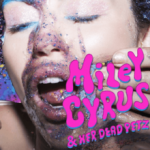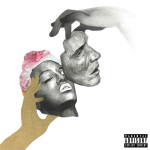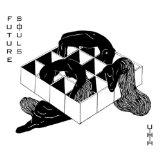John Preston’s been writing for MusicRiot for a few years now, but this year he’s started to concentrate on his work for Vada online magazine and we genuinely wish him all the best with that venture. We’ve managed to lure him back for his take on the five best albums of the year. Give some of these a listen, because John really knows his stuff.
 Miley Cyrus – “Miley Cyrus & Her Dead Petz”
Miley Cyrus – “Miley Cyrus & Her Dead Petz”
“Miley Cyrus & Her Dead Petz” is surprisingly sensitive and predominantly mid-tempo with even songs like “Bang My Box” and “Space Boots” being ladled with melancholia and not sounding as you might expect. In a year of Tidal exclusives versus ‘you will buy my album, I don’t care if you pay for streaming’, Miley Cyrus beyonced a brilliant album with minimal fuss for zero pence which anyone with an internet connection could listen to. She continues to piss the right people off and many won’t bother to listen. For someone who grew up with Madonna this is a familiar story and like the gnarly icon herself, Miley Cyrus is far from done.
 Chvrches – “Every Open Eye”
Chvrches – “Every Open Eye”
The Scottish trio have effectively made the third Yazoo album, the one that the eighties synth-duo never got around to finishing. Tight and upright melodies, shining and exhilarating electronics and with Lauren Mayberry’s regional accent punching out its many kiss-offs, “Leave a Trace” builds on what was promised on their 2013 debut and delivers a flawless start-to-finish album of perfect pop songs. Chvrches have perfected the art of making huge records that sound like the past and future colliding.
 Dawn Richard – “Blackheart”
Dawn Richard – “Blackheart”
Released at the top of the year, the second in a trilogy of albums, “Blackheart” was an often a bleak but breathtakingly beautiful record about redemption. Ultimately uplifting, Dawn Richard manages to cover the old story of hope that’s lost and then found in a new way and within a flinty futuristic soundscape that refuses to conform to traditional R’n’B structures and timeframes. Visionary and fearless, Dawn Richard star continues to rise and rise.
 Lana Del Rey – “Honeymoon”
Lana Del Rey – “Honeymoon”
The oddest pop-star of them all, Lana Del Rey reduces her trademark lyrical tics and sound stylings down to a sticky and claustrophobic pitch-black potion consisting of, you got it, sex, drugs and unrequited love. “Honeymoon” is Del Rey’s most honest and hard-core artistic statement yet with only snatches of camp (“Salvatore” rhymes soft ice cream with limousines) to lift the funereal mood. No longer as needy and as accommodating as before, Lana Del Rey continues to baffle but ultimately proves she is in a league of her own, demanding to be taken seriously.
 Braids – “Deep In the Iris”
Braids – “Deep In the Iris”
“Miniskirt” is a brittle kick in the gut and Braids most focused and attention-grabbing song of their career. Their third album “Deep in the Iris” has a kitchen sink, melodrama quality and riffs on mid-nineties British synth pop bands like Dubstar and Pet Shop Boys pre-slump. Drum ‘n’ bass, euphoric electro-pop choruses and a theme of sexual identity dominate an album that is far lighter and easy to absorb than this might at first suggest; don’t let Braids pass you by.
 The third album by LA-based female duo Uh Huh Her is meant to be their concession to dance music, not that you couldn’t play their previous material in a club but “Future Souls” is intended to take you further into the realm of abandoned dance floor hedonism. Camila Grey and Leisha Hailey should be congratulated for showing restraint and not making the EDM-polluted monstrosity that this could have been. It doesn’t chase trends and there are no David Guetta or will.i.am attempts at shoehorning six different sub genres into a four minute track. But then Uh Huh Her haven’t really made a dance record here at all. This album is in fact more of a continuation of their elegant, electro-pop sound but with considerably more electronics and fewer guitars. Whether it has reinforced and strengthened their position in a very crowded and ambitious arena will be mainly dependent on their songwriting skills and ability to establish a more defined personality – something they have struggled with before.
The third album by LA-based female duo Uh Huh Her is meant to be their concession to dance music, not that you couldn’t play their previous material in a club but “Future Souls” is intended to take you further into the realm of abandoned dance floor hedonism. Camila Grey and Leisha Hailey should be congratulated for showing restraint and not making the EDM-polluted monstrosity that this could have been. It doesn’t chase trends and there are no David Guetta or will.i.am attempts at shoehorning six different sub genres into a four minute track. But then Uh Huh Her haven’t really made a dance record here at all. This album is in fact more of a continuation of their elegant, electro-pop sound but with considerably more electronics and fewer guitars. Whether it has reinforced and strengthened their position in a very crowded and ambitious arena will be mainly dependent on their songwriting skills and ability to establish a more defined personality – something they have struggled with before.
An interesting reference point here is girl group All Saints, produced by William Orbit; very occasionally the quality comes closer to Orbit’s definitive work with Madonna on “Ray of Light”. It has a late 90’s naiveté both vocally and sonically, which can sound undernourished but can also shine and warm through with harmonies that can swell up unexpectedly, from an intro for example. And there are some good songs here too. Album opener “Innocence”, for example, creates a steady impression and beneath a lightly bouncing acid house synth motif the melodies morph into something smooth but sticky; it’s a surprise when it finally clicks. “Bullet” has a nicely thought out structure and nagging chorus and “Time” sounds a bit like a highly-polished Wendy and Lisa.
For a dance album it’s maybe surprising that the two best songs on “Future Souls” are the most introverted and intimate. “Strange Design” is both nurturing and arms-length, slowly spinning and calm with an obvious deb to the spooked and lush ballads of “Supernature”- era Goldfrapp. “Interconnect” is satisfyingly bolshy, with a cool and confident vocal but it’s still as considered and graceful as anything you would come to expect from the duo’s best material. And that is what reinforces the frustrations experienced elsewhere within the ten tracks found here. The evidence that the band can push themselves to make something memorable and compelling is often undermined by pleasant by completely disposable filler such as the auto tuned cliché of “It’s Chemical” and the thinness of “Nuthin Without Your Love” could be any one of an army of faceless electronics acts.
Uh Huh Her have a sizeable cult following that is undeniably linked to Leisha Hailey’s performance as Alice Pieszecki in the garish but often riveting series, The L Word. Hailey was the only out lesbian playing a lesbian in a show about lesbians. Her character was charismatic and spiky and in many ways the show’s moral compass – if only some of that character’s utter self-possession could be transposed to the duo’s musical ventures. Au Revour Simone, Chvrches and School of Seven Bells should be Uh Huh Her’s synth sisters in crime but where those female lead, synth-preoccupied groups each have an identifiable sound, UHH still suffer from a stranded sense of identity. This could be avoided if, instead of relying on self-production, the women allowed themselves to be guided and pushed by another studio professional. Although “Future Souls” is competent enough, let’s hope that the next album is the one that fully reveals the duo’s idiosyncrasies and tics in ways which are still only hinted at here.


